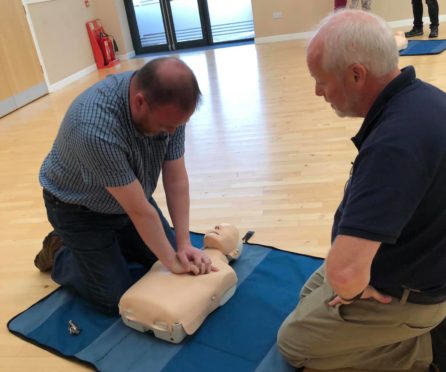A north-east MP is urging people to take part in CPR and defibrillator classes.
David Duguid, MP for Banff and Buchan, recently participated in one of the lifesaving volunteer medical training sessions in his constituency.
Turriff-born Mr Duguid was involved in a workshop at the Baden Powell Centre.
It was organised by the Sandpiper Wildcat Project which aims to save lives in the north-east by providing immediate care particularly in remote and rural areas.
He watched as volunteers taught attendees how to perform CPR and use defibrillator machines, which have been shown to give rural patients more time for ambulance crews to arrive in the event of a cardiac arrest.
Mr Duguid praised the excellent turnout of local residents, while urging others to take part and become volunteers.
He said: “The number of defibrillators is increasing across Banff and Buchan, and it is important that the public become familiar with their operation, as well as with potentially life-saving CPR.
“Any of us might come across someone suffering a cardiac arrest. Having the confidence to respond could mean the difference between life and death.
“We should also be grateful for the volunteer specialist cardiac arrest responders who are on call in many of our towns and villages.
“They can be counted on by the Scottish Ambulance Service while paramedics are on their way.
“However, the project would be very keen to hear from local residents with an interest in joining the team of volunteers.”
To find out more, visit www.sandpiperwildcat.co.uk.
Mr Duguid also acknowledged how vital this training could be, particularly for people in Turriff.
Figures unveiled last year by the Scottish Ambulance Service revealed that some patients in the north east community were left waiting more than three times the national target response time of eight minutes from the initial 999 call.
The average time for a response to a Turriff incident was 18 minutes and, in the worst cases, paramedic crews took 30 minutes to arrive.
Mr Duguid added: “I’ve been involved in recent discussions on keeping ambulance response times down in rural areas.
“Responders, public CPR knowledge and defibrillator availability may hold the key to saving lives.”
